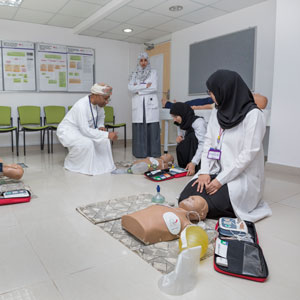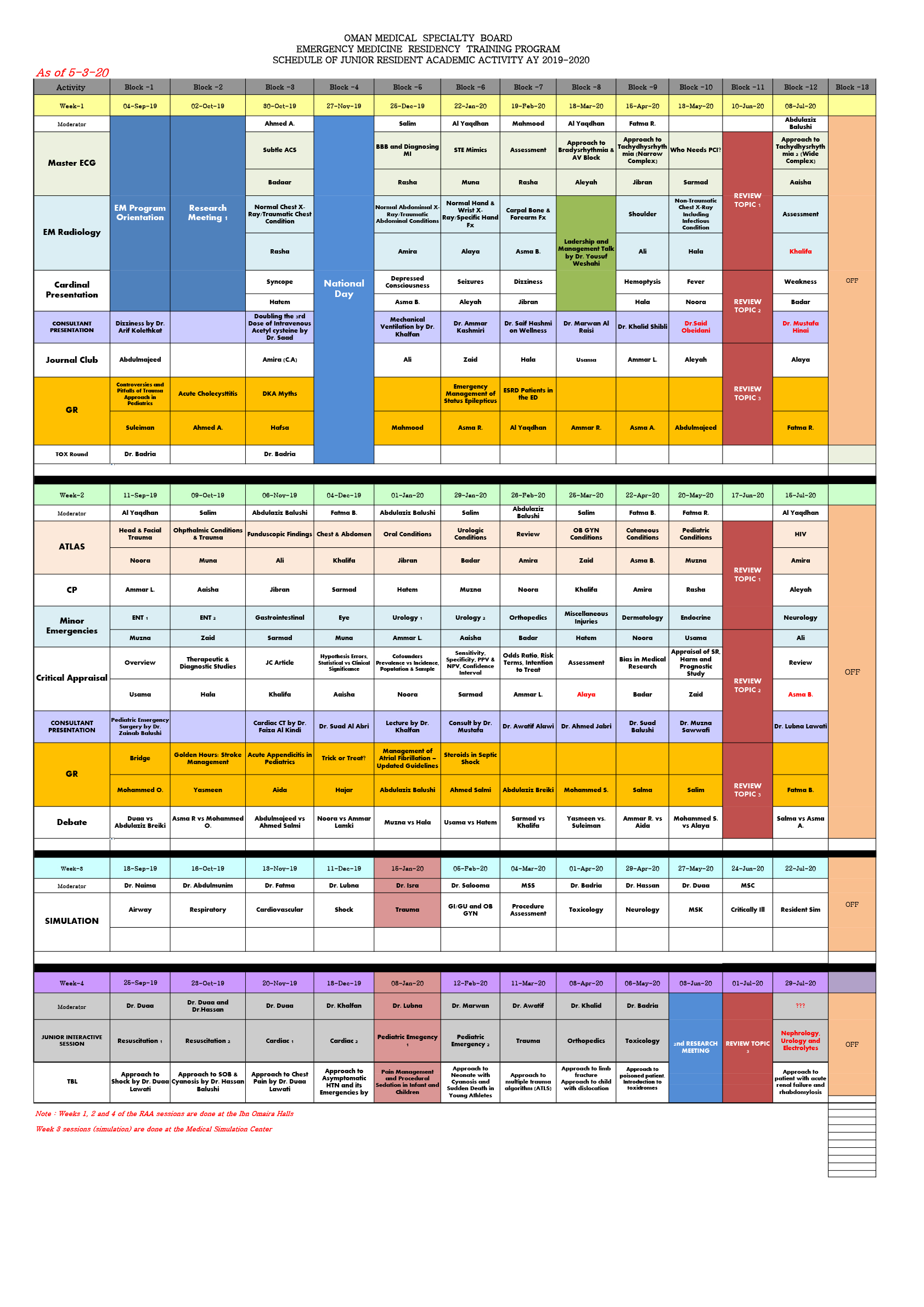
Emergency Medicine
Our mission in the Emergency Medicine Specialty Training is to emphasize on the acquisition of the ideal roles and competencies a specialist is expected to fulfil. These roles and competencies have been incorporated into the postgraduate residency training program. There are 6 competencies that we want to stress on: Patient Care, Medical Knowledge, Practice-Based Learning and Improvement, Interpersonal and Communication Skills, Professionalism and Systems-Based Practice. All our residents in Oman Medical Specialty Board – Emergency Medicine- will be evaluated (and potentially examined) based on these competencies
To achieve quality emergency health care through excellence in emergency medicine training.
Overall Program Objectives:
The specific pre-requisite knowledge or skill that the resident in emergency medicine should acquire in order to achieve the terminal education objectives in each of the core content categories will determine the program education objectives. These educational objectives should be identified prior to each rotational experience and in developing formal teaching program. Formal assessment that these objectives have been achieved should be provided through end of rotation evaluations and in-training examination of each resident. The resident in emergency medicine is expected to demonstrate specialist level abilities in the recognition, understanding and treatment of illness and injuries. During the course of education program, the resident must acquire and demonstrate satisfactory competence in knowledge, clinical skills, technical skills, and administrative skills and attitudes consistent with the practice of the breadth and depth of emergency medicine. During the course of training, the candidate must acquire satisfactory knowledge and skills in Emergency Medicine's following areas:
1. Primary care of the patient, declared emergencies including the recognition, evaluation and initial management of the illness or injury.
2. Triage of patients with major illness or injury.
3. The natural history of illnesses or injuries commonly presenting as emergencies and long term care and follow-up essential for these conditions.
4. Supervisory and administrative aspect of emergency services, ambulance services, communication systems and disaster planning.
5. Research areas of emergency medicine. 6. Social and family implications of illness or injury.
CHAIRMAN DR. MOHAMMED SALIM MOHAMMED AL SHAMSI
PROGRAM DIRECTOR DR. KHALFAN SAID DHIYAB AL AMRANI
Duration of the Residency Training Program: Five (5) years Required Rotations
· Emergency Medicine
· Pediatric Emergency
· Clinical Teaching Unit (CTU) ·
. Toxicology
· Coronary Care Unit (CCU)
· Intensive Care Unit (ICU)
· Anesthesia · OB GYN
· ENT
· Ophthalmology
· Radiology
· Psychiatry
· Pediatric ICU
· Internal Medicine
· Neurology
· Plastic Surgery
· Trauma
· Elective
· EMS
· Orthopedics
Research Training Centers
· Main Training Centers
SQUH
Royal Hospital
Khoula Hospital
Armed Forces Hospital
Regional Hospital for other Rotations and/or Electives
Al Nahdha Hospital
Sohar Hospital
Nizwa Hospital
Ibra Hospital
Rustaq Hospital
Minimum Requirements for Admission
· The trainees are selected as per the OMSB Rules and regulations.
· The resident must be of a holder of Bachelor’s Degree in Medicine & Surgery or equivalent from a recognized university.
· The resident must have completed a year of internship. · The resident must be medically fit for the training.
· The resident must provide three letters of recommendation from three consultants with whom he/she has worked confirming his/her ability and capability of training.
· The resident must submit a letter of approval from his/her sponsor confirming their permission to release him/her to join the specialty training on a full-time basis.
· The resident must pass the interview.
All registered residents must abide by the Institutional Policies and Guidelines by OMSB
General OMSB Evaluation Tools (list of evaluation forms only)
In Training Evaluation Report (ITER)
Presentation Evaluation Form
Evaluation of Procedural Skills
Mini-Clinical Evaluation Exercise Form (Mini CEX)
Journal Club Presentation Evaluation Form
Multi-Source Feedback Form (360 Degree Evaluation)
Case-Based Discussion
Research Block Evaluation Form
6-Monthly/Annual Evaluation Form
Final In Training Assessment Report (FITAR)
Program-Specific Evaluation Tools (list and pdf attachment)
Daily Evaluation Form
Progression Examinations:
OMSB End of Year Exam (Year 1 to Year 4)
OMSB Part 1 Exam (Year 2)
Exit Qualification:
OMSBPart 2 Written & Clinical

Education Committee Members
| 1. Dr. Mohammed Al Shamsi | (Chairman) |
| 2. Dr. Khalfan Al Amrani | (Program Director) |
| 3. Dr. Ammar Al Kashmiri | (Associate Program Director, Khoula Hospital) |
| 4. Dr. Naima Al Hinai | (Associate Program Director, Royal Hospital) |
| 5. Dr. Suad Al Abri | (Associate Program Director, SQUH) |
| 6. Dr. Said Al Obeidani | (Member, Royal Hospital) |
| 7. Dr. Badria Al Hatali | (Member, Royal Hospital) |
| 8. Dr. Suad Al Balushi | (Member, Al Nahdha Hospital) |
